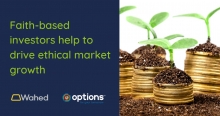
Reports about the growth of ethical solutions in the financial services sector often focus on the impact of net-zero and sustainability concerns, but it’s important to recognise that this trend is also being driven by faith-based investors.
Not so long ago, Muslims in the UK had a very limited choice of Sharia-compliant products (sometimes referred to as halal). The industry responded and (according to figures from the Bahrain-based General Council for Islamic Banks and Financial Institutions) the Islamic funds market grew by more than 300% in a decade.
Wahed Invest is one of the firms which has contributed to that growth. We partnered with Wahed in 2020 to launch our Sharia SIPP so that their Sharia model portfolios could be used within our Simple SIPP. It offers an effective solution for individuals and employers with Muslim staff (including some who may not have had a workplace pension previously because they could not find a Sharia-compliant plan). Again, this is an example of how the ethical investments sector has responded to market demand, and that the growth in the ethical sector is not all about sustainability and net-zero.
Having said that, while ESG (Environmental, Social & Governance) compliant investments and the Sharia-compliant sectors have clear differences, there are some areas where the two overlap. Fundamentally (as this article by PwC notes) the basis for both is to do no harm. This shared principle means that while such products as our Sharia SIPP are aimed primarily at the Muslim community, they can also interest non-Muslim clients who see such products as an ethical option that’s worth considering.
Wahed’s Sharia-compliant portfolios mean that a number of industries are off-limits, including tobacco, alcohol, firearms and gambling – all of which can also be considered as having a negative social impact when looked at from an ESG point of view.
In 2022 Wahed broke new ground in the world of ethical investments by launching NASDAQ’s first ever ESG-Aware and Sharia compliant ETF. Last year at the IFN UK Forum (Europe’s largest annual Islamic finance event) a key topic of debate was how Islamic finance can and must play a part in the UK’s transition to a low carbon economy. These and other examples are signs of overlapping and, to some extent, convergence as the ESG and faith-based markets evolve.
Looking at the bigger picture, there’s no doubt that the ethical investment sector is continuing to grow rapidly. We see that in the pensions and retirement planning sector, but the trend extends across the financial services industry. In the UK proof can be seen in the Ethical Markets Report (published by Ethical Consumer and Co-op) which has been acting as a barometer of market trends for over 20 years. It’s a report that’s trusted by businesses, academics and Government.
The latest complete annual data set that's available shows there is increasing awareness of ethical issues, especially around climate change, sustainability and the environment.
In fact, says Cathryn Higgs, Head of Environment, Sustainability and Policy at Co-op, awareness of climate and environmental issues amongst consumers is now ‘greater than it has ever been’.
The most recent report covers a wide range of sectors, including the ethical finance sector which grew by 50% year on year, with the bulk of that being driven by growth in ethical investments which rose by a staggering 83.7%. Breaking down that last percentage, it’s based on a rise from £33.3billion to £61.2billion year on year. This compares to just £11.3billion back in 2010.
Based on this and other reliable data, there’s no doubt that more and more individuals and businesses are thinking about the social cost, and social value, of every pound they spend or save. And those factors apply just as much to faith-based investors as they do to those motivated primarily by environmental and climate change concerns.
Disclaimer: As a SIPP provider, Options UK can provide information and guidance about what can and can’t be done within a pension scheme. We cannot provide advice as we are not regulated to do so – but we always recommend that advice is sought from an appropriately qualified regulated adviser before embarking on a financial investment.
